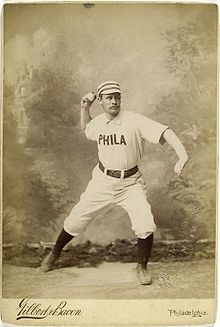 Ben Sanders. Photo credit- wikipedia.org
Ben Sanders. Photo credit- wikipedia.org That being said, a lot of credit has to go to the Society of American Baseball Research as well as many of those who keep the history of this game alive. In the past, I have written about several players from this time frame. A lot of them had issues, both mentally and physically, and had to deal with serious run-ins with the law. I found myself at times questioning whether a player such as Terry Larkin was a baseball player who engaged in criminal activity or a criminal who just happened to play baseball for a living. The next player I profile seems to have lived a life free of crime, at least according to wikipedia and baseball reference as well as google.
Ben Sanders was born on February 16, 1865, exactly 151 years ago to this day. He was born in Virginia and ended up going to Roanoke College after his completion of high school. He would finish his education at the University of Vanderbilt before signing with the Philadelphia Quakers of the National League. This was not very common as few Americans graduated high school at this time, let alone completing a four year college.
It was June 6, 1888 when Sanders made his big league debut as a pitcher for the Quakers. The Philadelphia National League ball club would remain as the Quakers through the 1889 season before becoming the Phillies. Sanders burst onto the scene, finishing with a league high eight shutouts, winning 19 games and completing the season with an earned run average of 1.90.
What allowed Ben Sanders to stand out was the fact that he was a very good hitter as well as a pitcher. If Sanders was a pro football player, he would be considered, "a great two way player." In his first season in Philadelphia, Sanders pitched in 31 games, 29 of them as a starting pitcher. In addition, he played 25 games in the outfield and another at third base. Though he was a league average hitter (a batting average of just .248 in his first season), it needs to be understood that outside of Deacon McGuire, no player on the Philadelphia squad hit for a higher average. And McGuire had only 51 at bats for the entire season (17-51, .333 batting average). McGuire also did not make it the entire season as he was released by the Quakers in August of the 1888 season. One of his teammates was a twenty-year old Ed Delahanty, who hit .346 for his career. Ed hit just .228 that season, the only one he played in where he did not hit at least .293.
In 1889, Sanders would get a little more of a workload as a pitcher. He pitched almost 75 more innings, winning the same 19 games for the Quakers. He played only three additional games in the outfield that season, but he did hit ,278 good enough for sixth on the team and well above the team batting average of .266. The following year, he would make the jump to the Player's League, started by the great John Montgomery Ward. He remained in Philadelphia with the Athletics where he won another 19 games. He also hit a career best .312, playing an additional ten games in the outfield. The Athletics were picked up by the American Association for the 1891 season and Sanders actually played more games in the outfield (22) than he pitched in (19). His final season was 1891 where he played for the National League's Louisville Colonels. He pitched in 31 games and played a combined 24 games at first base and in the outfield.
As a pitcher, Ben Sanders won 80 games, losing 70, and pitched to a 3.24 ERA in 1385 innings. As a hitter, he hit .271 in 948 at bats with 64 extra base hits and an on base plus slugging average of .676. Acccording to wikipedia.org, Sanders had an unorthodox delivery which led him well out of position to field a baseball. In fact, his back was almost completely turned against the hitter. He had very good control and almost threw a perfect game in his first season in 1888. A one out single in the ninth inning ended the bid. However, Sanders finally got his no hitter in his final season of 1892. Two months before he threw his last big league pitch, he accomplished the feat against the Baltimore Orioles. The Colonels won the game 6-2, marking the first time in National League history that a no hitter was thrown in a game in which a run was yielded.
Ben Sanders had the distinction of pitching for three different Philadelphia teams in three different leagues. Perhaps fans in the city of Philadelphia appreciated him. When Sanders passed away in 1930, he was buried in his home town of Catharpin, VA. It was also the town he was born in. According to baseball reference, Sanders remains today at that very cemetery.

 RSS Feed
RSS Feed
